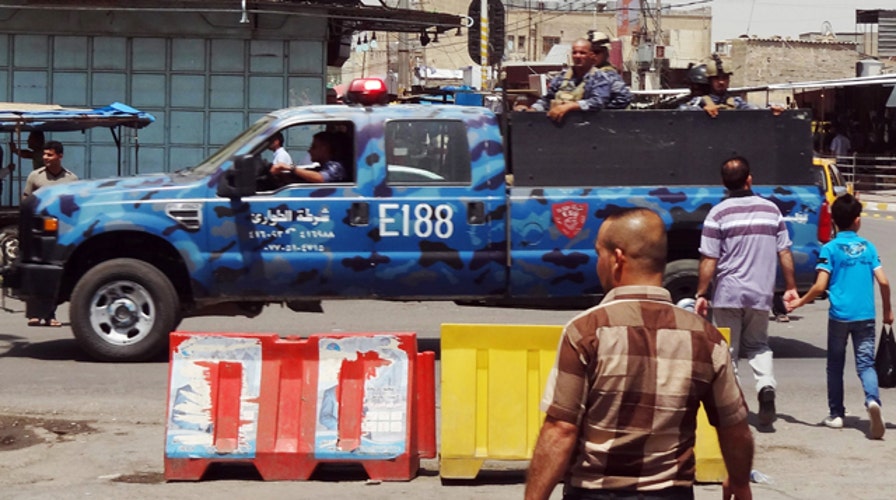US military not coming to Iraq's rescue?
Former CIA official Philip Mudd: 'There's not much we can do here... Maliki has made his bed'
Billions of U.S. dollars invested in training and equipping Iraq's security forces are in danger of going to waste as Iraqi soldiers abandon their posts in the face of Al Qaeda-aligned militants on a deadly march through the country's north -- not to mention the thousands of American lives lost in the nine-year war.
Iraqi security forces reportedly fled in two more towns late Thursday, after army divisions abandoned the cities of Mosul and Tikrit earlier in the week. Lawmakers and Obama administration officials were alarmed at how quickly the Iraqi Army, which U.S. forces spent years building up, effectively disintegrated in northern strongholds.
Sen. Joe Manchin, D-W.Va., called it a "surprise to everybody."
If Prime Minister Nouri al-Maliki cannot stop the desertions, however, it would represent a remarkable collapse of what was arguably the costliest project of the entire Iraq reconstruction.
According to an inspector general report issued last year, the U.S. government spent nearly $25 billion on "training, equipping and sustaining" the Iraqi security forces as of late 2012.
The money was poured into Iraq as part of the arduous process of restoring order after the fall of Saddam. In 2004, the country had a feeble army and an incompetent police force -- only a tiny fraction of whom were properly trained.
In fits and starts, the U.S. and its allies invested huge sums in building up and training a new force, renovating and building military bases, and providing hardware -- the effort continues to this day, with Iraq set to receive dozens of U.S.-built F-16 fighter jets.
By the time U.S. forces withdrew at the end of 2011, Iraq's trained security forces numbered more than 930,000. That included a 200,000-strong army, in addition to Iraqi police and other wings.
In a relative instant, those who worked on that mission are watching those gains melt away.
"Given past U.S. sacrifices, it's devastating to see terrorist groups taking over large cities in Iraq and marching to Baghdad," Rep. Ed Royce, R-Calif., chairman of the House Foreign Affairs Committee, said in a statement.
Reflecting the urgency among military commanders who served in Iraq, retired Gen. John Allen -- who helped lead forces in Anbar province for years -- told Defense One that the U.S. "must strike" the militants "with a hard blow."
"The U.S. will have to act to stop this onslaught. After all we've invested in Iraq's stability, including nearly 4,500 American lives, we have an obligation, and indeed we have the capability, to help now," he reportedly said.
President Obama said Friday he is reviewing various response options, but ruled out the possibility of sending U.S. troops into the country.
As for why U.S.-trained Iraqi forces are disintegrating, much of the blame rests with Maliki, officials say.
The controversial Iraqi leader is faulted for purging the army of senior leaders and replacing them with "cronies and hacks."
Retired Gen. Jack Keane, Fox News military analyst and former Army vice chief of staff, said that several years ago, the army was "well-led and it was competent" -- but morale "began to systematically break down for the last three years" because of "ineffective leaders."
But experts say the blame also lies with the U.S., and the failure to strike an agreement allowing U.S. forces to stay beyond 2011.
"We left [Maliki] to himself," Keane said, adding that the army is "kind of like a house where termites have been at it for years."
Iraqi security forces abandoning their posts also raises the risk that U.S.-provided military gear will fall into the hands of militants. Over the years, this has included everything from machine guns to grenades to sniper rifles to tank ammunition.
According to a report from the West Point Combating Terrorism Center, the Islamic State of Iraq and Syria (ISIS) "now possesses scores of Iraqi military equipment originally provided by the United States, from Humvees and cargo vehicles to small arms."
The same report speculated that a recent video from ISIS may have helped "instill fear" in the population and contributed to security forces dropping their arms. The video showed ISIS members executing officials, by decapitation and other means.
Earlier this week, the report said, soldiers in Mosul "shed their uniforms and blended into the populace" after top leaders fled to Kurdistan via helicopter.





